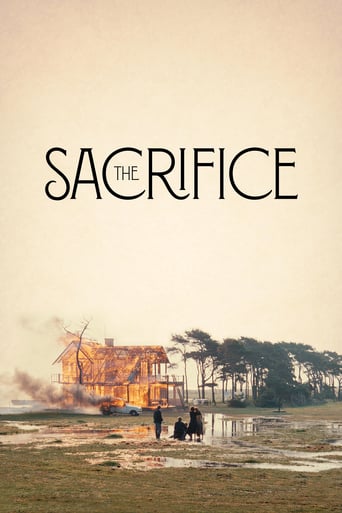mukherjeesubham93
My 3rd Tarkovsky movie. Isn't the maestro's best, But is still a Masterpiece. As always, his long shots create their own cinematic language. Use of reflections in mirrors is remarkable. It's a Swedish movie ( Tarkovsky's second and final movie out of Russia) and often reminds one of a Bergman movie. Sven Nykvist( Cinematographer) coincidentally was a regular collaborator with Bergman. Bergman and Tarkovsky always shared mutual respect for each other's work. This movie probably was a bit of a tribute to Bergman from the latter. The ending is hauntingly beautiful. Watch it to witness the end of an era. The end of Tarkovsky, who merged art with movies, like no man ever did.
Sergeant_Tibbs
The final and my final Andrei Tarkovsky film solidifies him in my top 10 directors of all-time list. The Sacrifice feels like a tour of everything Tarkovsky, though putting itself in the ideal middle ground as to explore them all. It features science-fiction, philosophy, mortality, male- female relationships, parent-child relationships, religion, magic, long shots, rich plots, nature and wide static angles. The imagery is a particular strong point, with his always incredible cinematography, as the colour is drained from the film during the World War III sequences and brought back subsequently. It has a very delicate and patient approach, but allows itself to explode with surprises without feeling contrived.Much of the dialogue elaborates anecdotal metaphors to the crumbling of life which represent the outer view of the world and are often fascinating. My only issues are the overacting of Susan Fleetwood (who is, interestingly enough, the younger sister to Mick Fleetwood of Fleetwood Mac, one of my favourite bands, odd that a British person should star in a Tarkovsky film) and it's sometimes too mythological rather than spiritual, with Maria being explained as being a witch rather than having it ambiguous or up for interpretation. I imagine this will be a film that will fascinate me more in rewatches, but I already adore the idea of the premise.8/10
Jose Cruz
Tarkovsky last film is still what we can expect given his previous films. This one, though, is darker in tone, certainly related to the fact that the director was dying of cancer while filming his last film. Tarkovsky is perhaps the greatest art film director who ever lived and it shows on all his films.Like The Mirror and Nostalghia, this film has gorgeous cinematography and it is worthy of watching only for the images. It is essentially plot less, though I have watched only once and thus I failed to absorb everything in this complex work of art.Given the impression it made on first watching I would rate it as inferior to Nostalghia, Andrei Rublev and the Mirror and roughly equivalent to Solaris. Still, it is great and rises above 99% of all films. Highly recommended for everyone who has the patience and the open mind to watch art films and I note that I am not the single biggest fan of art films.
Artimidor Federkiel
Tarkovsky movies aren't among the easiest films to appreciate instantly. Some argue they feel drawn-out, feature a very typical, hard to decipher imagery, a somewhat detached language, create all in all very inaccessible worlds, at least on first glance. In a way, yes, but once you get in you'll find that they always deal with essential issues of life and faith, grow on you and offer to explore new perspectives on repeated viewings, eventually leave a lasting impression. Take "Offret" ("The Sacrifice") for example.Not only was the movie shot in Sweden, but Tarkovsky also clearly channels Bergman in this one, even uses parts of his crew, which plays well into the themes at stake. But he more than re-hashes "Wild Strawberries", "The Seventh Seal" or similar Bergman works that deal with death or re-evaluation of one's life. At any rate it's Tarkovsky's last movie and in many ways autobiographical and personal. It is a deep character study and deals with the reflections of an intellectual on his past life, which becomes unhinged at some point - and the changed circumstances demand a final, definite answer. The film is carefully constructed and leads from seemingly casual conversations of a life that is in complete order to something rather different. However, while the path that leads to the conclusion might be there right in front of you on screen, it's up to the viewer to decide where to draw the line between reality, imagination or dream. The viewer also has it in hand to determine the ultimate reasons why certain things happen: whether an atheist has suddenly become pious in the face of death and God answers, or innermost convictions have surfaced, even if witchcraft is in play or the wheel of life itself just turns once more thanks to the Nietzschean eternal recurrence, a theory a certain postman ascribes to. The spectrum of Tarkovsky's "Sacrifice" is enormous and the picture is as substantial as the viewer is willing to concede.




